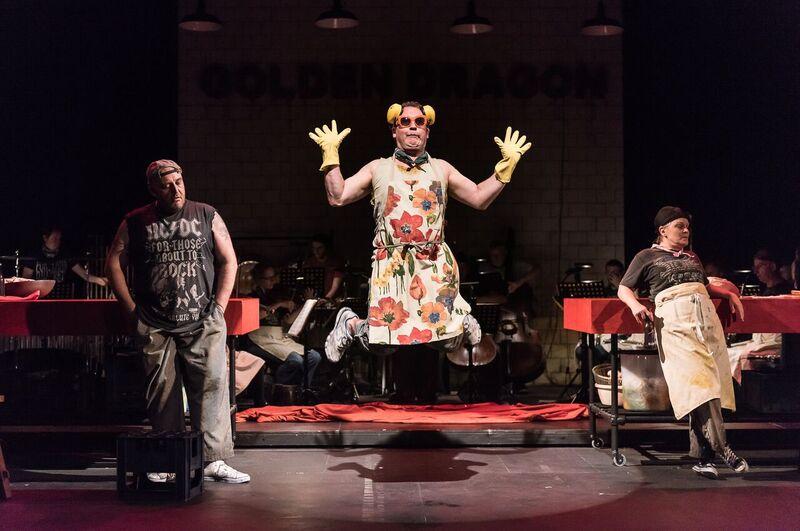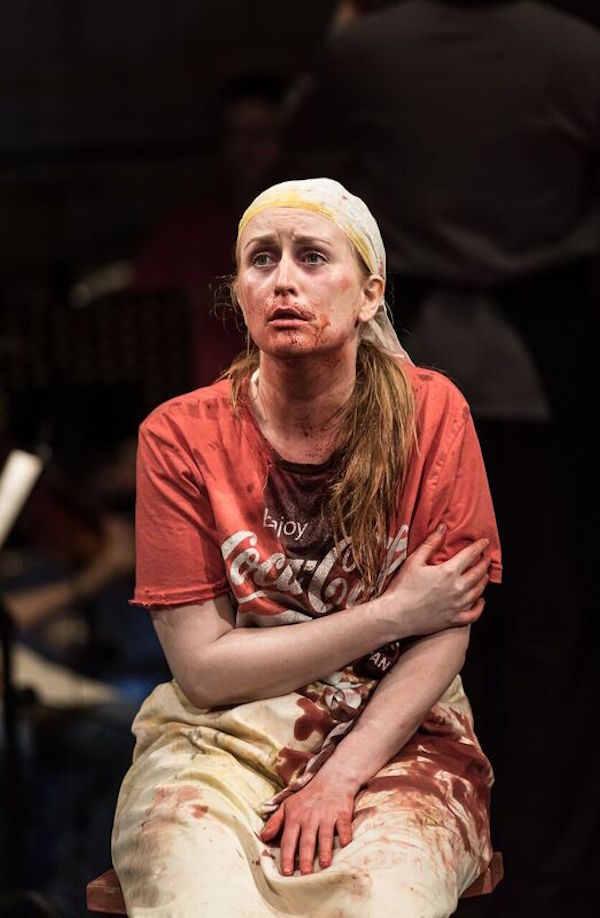The Golden Dragon, Music Theatre Wales, Buxton Festival | reviews, news & interviews
The Golden Dragon, Music Theatre Wales, Buxton Festival
The Golden Dragon, Music Theatre Wales, Buxton Festival
Peter Eötvös's new opera finds a world in a grain of egg fried rice

It’s the kitchen of a Thai-Chinese-Vietnamese fast food restaurant. The onstage orchestra wear sweatbands and T-shirts, and a red work surface stretches across the stage. As the four chefs take the stage, the clatter of pans and knives is first noise, then a rhythm, then an overture of sizzling, clanging, chopping and hissing sounds that spreads throughout the whole orchestra.
The Golden Dragon is the name of said restaurant, and the opera – adapted from a play by Roland Schimmelpfennig and performed in an English translation by Gregory Vajda – tells the story of one evening in its kitchen. Stories and lives collide, immigrants long for home, and that case of toothache takes a macabre and tragic turn. Counterpointed against it all is a retelling of Aesop’s fable of the Cricket and the Ant, given a particularly nasty anti-capitalist twist.
Llio Evans's story holds everything together This is an opera with a point to make, so it’s regrettable that the characters are described simply as “Asians” and that Eötvös’s score makes such ready use of the clichés of musical orientalism: gongs and gamelan effects. True, the recurring gong strokes are artfully distorted, and doubtless the intention was to critique oriental clichés in western music. The problem, of course, being that music that’s intended satirically has a habit of sounding indistinguishable from the real thing.
That aside, this UK premiere production by Music Theatre Wales is a compelling, entertaining and ultimately affecting 90 minutes of music drama. There’s a wit to Eötvös’s effects: the characters regularly drop out of character, offering spoken commentary on the action, and suddenly changing nationality and sex. The sight of the two alpha males of the kitchen, Johnny Herford and the imposingly tattooed Jeffrey Lloyd-Roberts, as handbag-toting air stewardesses, drew giggles from the Buxton crowd; as did the orchestra’s deadpan practice of announcing “Long Pause” or “Short Pause” in the gaps in the music.
More importantly, the whole company was on top not only of Eötvös’s gnarlier vocal writing, but the numerous stretches where the music took real lyrical flight. Lucy Schaufer was clear and compassionate as the Woman Over Sixty, Andrew Mackenzie-Wicks camped it up cheerfully as the Waitress, and everyone on stage was equally convincing when called upon to transform themselves instantaneously and repeatedly into insects, grandparents, or teenage girls. It’s a tribute to the clarity of the libretto – and Michael McCarthy’s direction – that the many strands of the story unfolded so comprehensibly.
 And it’s a particular tribute to Eötvös’s playful, endlessly subtle score. Throughout, the orchestra under Geoffrey Paterson underlined and commented upon the action, shimmering, chiming, dissolving into gnat squeaks or lurching quietly, queasily downwards as something nasty turns up in the soup. Above all, though, it’s a tribute to Llio Evans’s (pictured right) performance as the one character who doesn’t shift identity, and whose story holds everything together: that toothache-suffering Chinese immigrant, described throughout as The Little One. Scruffily dressed, Evans made a touching figure: trusting, pleading, grappling all the time with a pain that – it only gradually became apparent – went far beyond an infected tooth.
And it’s a particular tribute to Eötvös’s playful, endlessly subtle score. Throughout, the orchestra under Geoffrey Paterson underlined and commented upon the action, shimmering, chiming, dissolving into gnat squeaks or lurching quietly, queasily downwards as something nasty turns up in the soup. Above all, though, it’s a tribute to Llio Evans’s (pictured right) performance as the one character who doesn’t shift identity, and whose story holds everything together: that toothache-suffering Chinese immigrant, described throughout as The Little One. Scruffily dressed, Evans made a touching figure: trusting, pleading, grappling all the time with a pain that – it only gradually became apparent – went far beyond an infected tooth.
In telling the story of individuals to whom society gives no voice, it was inspired touch from Eötvös to make so much of The Little One’s music wordless (at one point she squeaked through a gag). Only after The Little One’s lifeless body is floating away downriver does she finally get to sing out, sweetly and radiantly, in the great poignant aria of homecoming and loss towards which the whole work, it’s finally clear, has been building. Eötvös stops joking, stops twitching, and provides an orchestral accompaniment whose dark, juddering iridescence sounds like nothing so much as the Lake of Tears from Bartók’s Bluebeard’s Castle. Intentional? Ironic? What matters is that it feels like he means it – and that we feel it too.
rating
Share this article
The future of Arts Journalism
You can stop theartsdesk.com closing!
We urgently need financing to survive. Our fundraising drive has thus far raised £49,000 but we need to reach £100,000 or we will be forced to close. Please contribute here: https://gofund.me/c3f6033d
And if you can forward this information to anyone who might assist, we’d be grateful.

Subscribe to theartsdesk.com
Thank you for continuing to read our work on theartsdesk.com. For unlimited access to every article in its entirety, including our archive of more than 15,000 pieces, we're asking for £5 per month or £40 per year. We feel it's a very good deal, and hope you do too.
To take a subscription now simply click here.
And if you're looking for that extra gift for a friend or family member, why not treat them to a theartsdesk.com gift subscription?
more Opera
 Orpheus and Eurydice, Opera Queensland/SCO, Edinburgh International Festival 2025 review - dazzling, but distracting
Eye-popping acrobatics don’t always assist in Gluck’s quest for operatic truth
Orpheus and Eurydice, Opera Queensland/SCO, Edinburgh International Festival 2025 review - dazzling, but distracting
Eye-popping acrobatics don’t always assist in Gluck’s quest for operatic truth
 MARS, Irish National Opera review - silly space oddity with fun stretches
Cast, orchestra and production give Jennifer Walshe’s bold collage their all
MARS, Irish National Opera review - silly space oddity with fun stretches
Cast, orchestra and production give Jennifer Walshe’s bold collage their all
 Káťa Kabanová, Glyndebourne review - emotional concentration in a salle modulable
Janáček superbly done through or in spite of the symbolism
Káťa Kabanová, Glyndebourne review - emotional concentration in a salle modulable
Janáček superbly done through or in spite of the symbolism
 Buxton International Festival 2025 review - a lavish offering of smaller-scale work
Allison Cook stands out in a fascinating integrated double bill of Bernstein and Poulenc
Buxton International Festival 2025 review - a lavish offering of smaller-scale work
Allison Cook stands out in a fascinating integrated double bill of Bernstein and Poulenc
 Tosca, Clonter Opera review - beauty and integrity in miniature
Happy surprises and a convincing interpretation of Puccini for today
Tosca, Clonter Opera review - beauty and integrity in miniature
Happy surprises and a convincing interpretation of Puccini for today
 Hamlet, Buxton International Festival review - how to re-imagine re-imagined Shakespeare
Music comes first in very 19th century, very Romantic, very French operatic creation
Hamlet, Buxton International Festival review - how to re-imagine re-imagined Shakespeare
Music comes first in very 19th century, very Romantic, very French operatic creation
 Falstaff, Glyndebourne review - knockabout and nostalgia in postwar Windsor
A fat knight to remember, and snappy stagecraft, overcome some tedious waits
Falstaff, Glyndebourne review - knockabout and nostalgia in postwar Windsor
A fat knight to remember, and snappy stagecraft, overcome some tedious waits
 Salome, LSO, Pappano, Barbican review - a partnership in a million
Asmik Grigorian is vocal perfection in league with a great conductor and orchestra
Salome, LSO, Pappano, Barbican review - a partnership in a million
Asmik Grigorian is vocal perfection in league with a great conductor and orchestra
 Semele, Royal Opera review - unholy smoke
Style comes and goes in a justifiably dark treatment of Handelian myth
Semele, Royal Opera review - unholy smoke
Style comes and goes in a justifiably dark treatment of Handelian myth
 Le nozze di Figaro, Glyndebourne review - perceptive humanity in period setting
Mostly glorious cast, sharp ideas, fussy conducting
Le nozze di Figaro, Glyndebourne review - perceptive humanity in period setting
Mostly glorious cast, sharp ideas, fussy conducting
 Fidelio, Garsington Opera review - a battle of sunshine and shadows
Intimacy yields to spectacle as Beethoven's light of freedom triumphs
Fidelio, Garsington Opera review - a battle of sunshine and shadows
Intimacy yields to spectacle as Beethoven's light of freedom triumphs
 Dangerous Matter, RNCM, Manchester review - opera meets science in an 18th century tale
Big doses of history and didaction are injected into 50 minutes of music theatre
Dangerous Matter, RNCM, Manchester review - opera meets science in an 18th century tale
Big doses of history and didaction are injected into 50 minutes of music theatre

Add comment